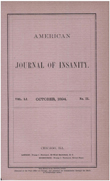Parenting: a genetic-epidemiologic perspective
Abstract
OBJECTIVE: To understand the relation between parenting and later psychopathology, it is important to clarify the role of genetic and environmental factors in both the elicitation and the provision of parenting behavior. METHOD: A 16-item version of the Parental Bonding Instrument was administered to 1) 606 fathers and 848 mothers of an epidemiologic sample of adult female-female twin pairs, who reported on their parenting of their twins; 2) the twins (both members of 546 monozygotic and 390 dizygotic pairs), who reported on the parenting they had received from their father and mother; 3) co-twins from these pairs, who reported on the parenting provided by their father and mother to their twin sister; and 4) members of the adult twin pairs (145 monozygotic and 117 dizygotic) who both had children, who reported on the parenting they provided to their offspring. The data were subjected to model fitting decomposing three sources of variance: additive genetic factors; family, or common, environment; and an individual's unique environment. RESULTS: Responses to the Parental Bonding Instrument produced three factors: parental warmth, protectiveness, and authoritarianism. According to parents, these factors were largely a common environmental experience for their children. Responses from twins, however, indicated that genetic factors played a substantial role in the elicitation of warmth from parents and a more modest role in influencing parental protectiveness and authoritarianism. While reports of twins and co-twins on protectiveness and authoritarianism yielded similar results, analysis of responses from co-twins indicated a degree of importance of genetic factors in eliciting parental warmth which was midway between that from parents' reports and twins' reports. Answers from twins as parents indicated that provision of warmth was substantially heritable, while resemblance between twins in providing protectiveness and authoritarianism was due to family environment. CONCLUSIONS: The provision of parenting is influenced by attitudes derived from the parent's family of origin as well as by genetically influenced parental temperamental characteristics. The elicitation of parenting is influenced by temperamental traits of the offspring that are, in turn, under partial genetic control. Genetic factors in both parent and child are more important for warmth than for protectiveness or authoritarianism.
Access content
To read the fulltext, please use one of the options below to sign in or purchase access.- Personal login
- Institutional Login
- Sign in via OpenAthens
- Register for access
-
Please login/register if you wish to pair your device and check access availability.
Not a subscriber?
PsychiatryOnline subscription options offer access to the DSM-5 library, books, journals, CME, and patient resources. This all-in-one virtual library provides psychiatrists and mental health professionals with key resources for diagnosis, treatment, research, and professional development.
Need more help? PsychiatryOnline Customer Service may be reached by emailing [email protected] or by calling 800-368-5777 (in the U.S.) or 703-907-7322 (outside the U.S.).



